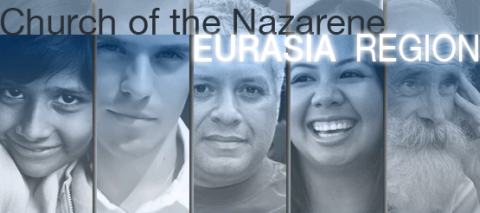
Eurasia fields reorganized, new leaders named

During annual meetings in Northern Ireland in April, leaders in the Eurasia Region proposed the realignment of several fields as a response to increasingly demanding staff workloads, leadership changes, and missiological developments.
The changes also are a response to a significant drop in the Eurasia Region's budget over the past four years, as a result of the incremental reductions in the World Evangelism Fund, and because of the drop in purchase power of the U.S. dollar against the European Euro and the Swiss Franc.
The director of Global Mission, as well as the jurisdictional general superintendent, approved the new plan.
The plan includes creating a new field that consolidates pioneer and developing districts of Northern Europe with the pioneer works of the Southeast Europe Field.
This new field, named Central Europe Field, will include Hungary, Poland, and Scandinavia, along with the current districts in Southeastern Europe.
The rationale for this decision is that Hungary and Poland have a different history of Nazarene church development than the other districts in Northern Europe. In addition, Scandinavia has now expanded to be part of a broader pioneer "Baltic Connection" and it will require a similar missionary strategy of pioneer and developing works in the region.
The countries in the Southeast Europe Field include many other relatively new works, such as Albania, Kosovo, Croatia, and Romania.
Jay Sunberg will be the field strategy coordinator for the newly consolidated field; he and his family will move to Budapest, Hungary.
Greece, which is currently in the Southeast Europe Field, will move to the administration of the Western Mediterranean Field. This does not bring workload or financial changes to Field Strategy Coordinator Kyle Himmelwright, as there is no mission work in Greece at this time.
The remaining districts of the Northern Europe Field are financially self-supported.
Philip McAlister, who has been the field strategy coordinator for Northern Europe, will play a facilitating role for these districts in Northern Europe. He will act as a strategic liaison, missional adviser, and fellowship convener for the four European district superintendents: British Isles North, British Isles South, Germany, and Netherlands.
His title changes to field strategy convener, a similar strategic role for the members of the District Superintendent Advisory Committee (DSAC) members in the USA/Canada Region.
There will be neither missionary contract nor field operational budget assigned to this non-administrative field. This represents significant savings to the region's personnel and operational budgets.
McAlister continues as a member of the regional leadership and field strategy coordinator teams.
In the India Field, managing 13 districts is a huge workload that makes it unnecessarily difficult for Sunil Dandge, as the sole field strategy coordinator, to cast vision and provide strategic direction.
The team proposed appointing three assistant field strategy coordinators to distribute the day-to-day management of the India Field. Each is a district superintendent and will work, like McAlister, as strategic conveners.
Rev. Wankhede will oversee Northwest India, which includes six districts. Rev. Chaterjee will oversee Northeast India, which has three districts. Rev. Jayakumar will oversee South India, which has four districts.
Additionally, Clive Burrows plans to retire from his role as field strategy coordinator for the Commonwealth of Independent States (CIS) Field May 31. Lonnie Norris has been approved by denominational leadership to take the reins June 1.
McAlister has been elected as district superintendent of the British Isles North District effective May 1.
The Eurasia Region's Field Strategy Coordinator Team believes these changes will maximize missional effectiveness, reduce operational costs, delegate missionary workload, and project the future of the fields in missiologically developed areas as required by current realities.
--Eurasia Regional Office
